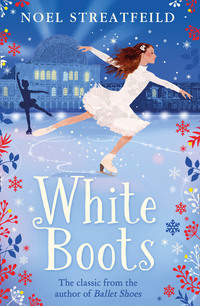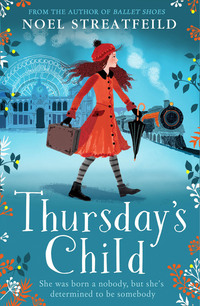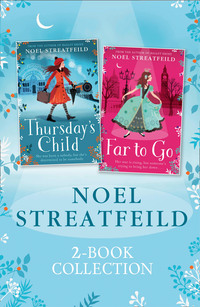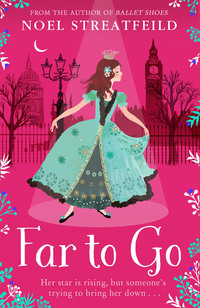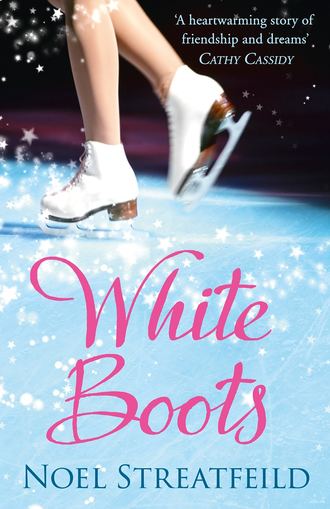
Полная версия
White Boots
LALLA’S HOUSE WAS the exact opposite of Harriet’s house. It was not far away, but in a much grander neighbourhood. It was a charming, low, white house lying back in a big garden, with sloping lawns leading down to the river. Where the lawn and the river joined there was a little landing stage, to which, in the summer, Lalla’s Uncle David kept his motor launch tied. Lalla’s rooms were at the top of the house. A big, low room looking over the river, which had been her nursery, was now her schoolroom, and another big room next to it, which had been her night nursery, was now her bedroom. As well there was a room for Nana and a bathroom. Her bedroom was the sort of bedroom that most girls of her age would like to have. The carpet was blue and the bedspread and curtains white with wreaths of pink roses tied with blue ribbons on them, and there was a frill of the same material round her dressing-table. The only ugly thing in the room was the glass case over her bed in which the skates and boots in which her father was drowned were kept. The nicest skating boots in the world are not ornamental, and these, although they had been polished, looked as though someone had been drowned in them, for the black leather had got a brownish-green look. Underneath the case was a plaque which Aunt Claudia had put up. It had the name of Lalla’s father on it, the date on which he was born, and the date on which he was drowned, and underneath that he was the world’s champion figure skater. Above the case Aunt Claudia had put some words from the Bible: “Go, and do thou likewise.” This made people smile for it sounded rather as if Aunt Claudia meant Lalla to be drowned. Lalla did not care whether anybody smiled at the glass case or not, for she thought it idiotic keeping old skates and boots in the glass case, and knew from what Nana had told her that her father and mother would have thought it idiotic; in fact she was sure everybody thought it idiotic except Aunt Claudia.
The schoolroom, which Lalla sometimes forgot to call the schoolroom and called the nursery, was another very pretty room. It had a blue carpet and blue walls, lemon-yellow curtains and lemon-yellow seats to the chairs, and cushions to the window seats. It still had proper nursery things like Lalla’s rocking-horse and dolls’ house, and a toy cupboard simply bulging with toys, but as well it had low bookcases, full of books, pretty china ornaments, good pictures and a wireless set. The only things which did not go with the room were on a shelf which ran all down one wall; this was full of the silver trophies that her father had won. It is a very nice thing to win silver trophies, but a great many of them all together do not look pretty; the only time Lalla liked the trophies was at Christmas, because then she filled them with holly, and they looked gay. Although every trophy and medal had her father’s name on it, where he had won it, what for, and the date on which it had been won, Aunt Claudia was afraid Lalla might forget to read the inscriptions, which was sensible of her because Lalla certainly would not have read them, so underneath the whole length of the shelf was a quotation from Sir Walter Scott altered by Aunt Claudia to fit a girl by changing “his” and “him” into “her”. “Her square-turn’d joints and strength of limb, Show’d her no carpet knight so trim, But in close fight a champion grim.” When Aunt Claudia came to the nursery she would sometimes read the lines out loud in a very grand acting way. She hoped hearing them said like that would inspire Lalla to further effort, but all it did was to make Lalla decide that she would never read any book by Sir Walter Scott. Sometimes Lalla and Nana had a little joke about the verse; Lalla would jump out of her bed or her bath and fling herself on Nana saying “Her square-turn’d joints and strength of limb” and then she would butt Nana with her head and say “That butt never came from a carpet knight, did it?”
On the day that Lalla met Harriet she and Nana had an exceptionally gay tea. Nana had let Lalla do what she loved doing, which was kneeling by the fire making her own toast, instead of having it sent up hot and buttered from the kitchen, which meant the top slice had hardly any butter on it because it had run through to the bottom one. They talked about Harriet and the rink, Lalla in an excited way and Nana rather cautiously. Lalla laughed at Nana and said she was being “mimsy-pimsy” and asked if it was because she didn’t like the Johnsons. Nana shook her head.
“I liked them very much, dear; Mrs Johnson’s a real lady, as anyone can see, and little Harriet, for all she’s so shabby, has been brought up as a little lady should. But I don’t want you to go fixing your heart on having her here. You know what it is, your Aunt Claudia has got strict ideas of who you should know, and I don’t think, if she was to see Harriet, she would think she was your sort, not having the money to live as you do.” Nana could see this was going to make Lalla angry, so she added:“Now don’t answer back, dear, you know I’m speaking sense. I don’t think it matters about what money a person has, no more than you do, but your aunt’s your guardian, and she sets great store by money, and you know you’ve been brought up never to want for anything, so you must be a good girl and not mind too much if you’re not allowed to have Harriet here.”
“But I want to go to Harriet’s house. I want to be in a family.”
“I dare say, but maybe want will have to be your master. The one that pays the piper calls the tune, and the piping in this house is done by your Aunt Claudia, and you know it.”
Nana had only just finished saying this when the door opened and Aunt Claudia walked in. Nana was swallowing a sip of tea, and she was so upset at Aunt Claudia having so narrowly missed hearing what she had said that she choked. Lalla thought this funny and began to giggle. Aunt Claudia did not like either choking or giggling, and her voice sounded as though she did not. She was a very nice-looking aunt in a hard sort of way. She had fair hair that looked as if it had been gummed into place, because there was never one hair out of order; her face was always beautifully made up, so that cold winds, hot weather, even colds in the head, never made any difference to it. She wore beautiful, expensive clothes and lovely jewels. Although she felt annoyed to find Nana choking and Lalla giggling, she did not let it show on her face, because she knew that made wrinkles. The only place where it showed was in her blue eyes, which had a sparkish look.
“Good evening, Nurse. Can’t you control that noise, Lalla, I don’t think you should find it funny when Nurse is choking.” She waited till Nana’s last choke died away, and Lalla had stifled her giggles. “I don’t seem to have seen you all the week, and I’ve got a few minutes before I go out, so I thought I’d hear how your skating is progressing. Have you mastered the one foot eight?”
Lalla was not being very quick at the one foot eight because she was not trying hard enough.
“It’s not right yet, at least not right enough for Mr Lindblom, but I’m working at it, aren’t I, Nana?”
Nana was glad that after Harriet had gone she had sent Lalla back to work at that figure. It would have been difficult for her to sound convincing if what she could remember was Lalla holding up Harriet while Harriet lifted first one foot and then the other off the ice.
“She worked nicely today, ma’am. I’m sure you would be pleased with her.”
Aunt Claudia pulled up an armchair to the fire and sat down.
“Why today? Surely every day. You are so lucky, Lalla; how many thousands of girls throughout the country would envy you your opportunities to learn, and your gift?”
Lalla had heard this kind of thing so often that it went in at one ear and out at the other.
“They’re awfully difficult figures for the inter-silver.”
Aunt Claudia beckoned to her. Lalla came to her unwillingly. Aunt Claudia drew her down to sit on the arm of her chair.
“That’s not the eager face I like to see. I know you don’t care for figure skating as you do for free skating, but you know as well as I do that you’ve got to know all these figures to perfection before you can become world champion.”
Lalla wriggled.
“Suppose I never was world champion, it would seem mean to have spent such ages learning figures.”
Aunt Claudia forgot her make-up and frowned. Her voice was severe.
“Lalla! You know I don’t like that kind of talk. You will be a world champion. Already you’re the most gifted child in the country. I know that in your heart of hearts you live for nothing else but your skating, but sometimes you say things which hurt me very much. You are dedicated to follow in your father’s footsteps and you know it.” She raised her eyes to the silver cups. Lalla, knowing what was coming, looked over her shoulder at Nana and made a face. Aunt Claudia took a deep breath and raised her voice:‘“Her square-turn’d joints and strength of limb, Show’d her no carpet knight so trim, But in close fight a champion grim.’” Nana’s reverent “And very nice too, ma’am,” sounded almost like Amen.
Aunt Claudia got up and shook out her skirts.
“Well, I must be going to my cocktail party.” She held Lalla’s hand and led her towards the door. At the door she turned and pointed again to the cups.
“Cyril Moore’s daughter. Lalla Moore, world champion. We’ll make his name live again, won’t we dear? Goodnight. Goodnight, Nurse.”
After Aunt Claudia had gone Lalla came back to the table to finish her tea, but it wasn’t a gay tea any more; the toast didn’t taste as good as when Aunt Claudia came in. Nana saw Lalla was playing about with her toast.
“It’s no good worrying, dear. You can only do the best you can.”
Lalla stabbed at her toast with her knife.
“You say that because nobody thought when you were nearly ten that you had got to be a world champion at anything.”
Nana thought back to her childhood. She saw herself and her eight brothers and sisters sitting round the table at the lodge of the big house where her father was gardener, and she heard him, in her memory, say as he had said very often when she was little: “I don’t mind what work any of you do as long as you have your feet under somebody else’s table.” This meant they should take jobs where their homes were provided, and their breakfast, dinner, lunch and tea, so that all the money they earned, even if it was not very much, they had to spend on other things besides living. She remembered the cosy feeling it had given her when her father had said that, because she had always meant to go into service, to work in a nursery, so what her father wanted she wanted, and nothing could have been nicer. She was sorry for Lalla; she thought it must be terrible to have to be the best lady champion skater in the world, and sometimes trembled to think what would happen if Lalla did not manage to be. Lalla loved skating when she could do what she liked, but Mr Lindblom often had to scold her about the way she did figures, and sometimes she had heard him say: “You are not trying, Lalla. You could do it if you worked.” Every time he said things like that Nana’s heart gave a jump, and she thought how lucky it was that Aunt Claudia was not at the rink to hear him. She got up.
“I’ll clear the tea. What are you going to do till bedtime? That jigsaw puzzle?”
Lalla turned on the wireless, but there was nothing happening that she was in the mood to hear, so she turned it off again and wandered out into the passage, feeling cross and loose-endish. She hung over the banisters and watched Aunt Claudia go downstairs dressed for a cocktail party. She admired Aunt Claudia’s clothes very much and thought how nice it would be to be grown up, going to parties whenever you liked, wearing a mink coat. She heard Aunt Claudia speak to the parlourmaid. “Tell Mr King I did wait, will you, Wilson, but I went on without him, and will he please follow me, he knows where the party is.” Wilson said, “Yes, ma’am,” opened the front door and then shut it. Lalla liked Wilson, so she slid down the banisters to her on her tummy. Wilson watched her arrive and made clicking, disapproving sounds.
“If I was your Nana I’d take a strap to you if I saw you doing that. Look at the front of your white jersey!”
Lalla put her arm through Wilson’s.
“Do you think Uncle David’s going to the cocktail party?”
Wilson’s eyes twinkled.
“Not if he can help it, he won’t. You know what he thinks of them.” She lowered her voice. “I didn’t say so to your auntie, but when he was going out this morning he said to me,‘I think I shall be kept at work tonight, Wilson, so I’ll be too late to go to the party Mrs King’s going to, you’d better put drinks in my study.’”
Lalla gave a pleased skip.
“Good. I shall come down and talk to him.”
On the days when Aunt Claudia was out alone, Lalla often came down and talked to her step-uncle. Uncle David was a long, thin man with dark hair and blue eyes. He had always wanted to have a daughter, so he was pleased that Aunt Claudia had a baby girl ward. From the very beginning he had been fond of Lalla, and as she grew older and became more of a companion, he got fonder still; but he had to keep what friends he and Lalla were a secret from Aunt Claudia, for from Aunt Claudia’s point of view he was not a suitable friend for Lalla, for he had a great failing. No matter how often Aunt Claudia explained to him about Lalla’s father, nor how often she repeated to him the praise and nice things people at the rink said about Lalla, she could not make him take Lalla’s skating seriously. He was the sort of man who thought skating, like games, was a lovely hobby, but a nuisance when you tried to be first-class at it. Obviously feeling as she did about skating for Lalla, Aunt Claudia did not like that sort of talk in front of her, so she did not let her see more of her step-uncle than she could help.
Uncle David was sitting on the leather top of his fender, drinking a whisky and soda, when Lalla came in. He was pleased to see her.
“How’s the seventh wonder of the world this evening?”
Lalla did not mind being teased by Uncle David. She sat down next to him on the top of the fender, and told him about her afternoon and how she had met Harriet.
“You can’t think how nice she is. She’s just the same age as me, but taller, but that’s because she’s been in bed for months and months, so her legs have got very long. She is so thin.” Lalla held up her hands about twelve inches apart. “Even the thickest part of her is not thicker than that, and she’s got the most gorgeous mother called Mrs Johnson and she’s got three brothers and a father. Oh, I do envy her, I wish I had three brothers.” She looked up anxiously at Uncle David. “I want awfully for her to come to tea with me, and me to go to tea with her; Nana thinks I won’t be able to because she isn’t rich like we are. Can you think of any way which would make her being poor not matter to Aunt Claudia?”
Uncle David was a sensible sort of man; he never treated Lalla as if, because she was a child, she was more silly than a grown-up. He lit a cigarette while he thought over what she had said.
“What’s the father?”
Lalla lowered her voice.
“Nana doesn’t know, but it’s some sort of a shop.”
Uncle David whispered back:
“You and I don’t care how anyone earns their living, do we, as long as it’s honest? But I don’t think your aunt’s going to cotton on to a shop.”
“I think it’s rather an odd sort of shop. Harriet said they only sold things that their Uncle William grew or shot or caught on his land in the country. And that was why they were so poor, because her Uncle William eats a lot so they only get what’s left.”
Uncle David was gazing at the carpet, as if by looking at it very hard he could see into the past.
“William Johnson. William Johnson. That strikes a note. I suppose Harriet didn’t say what her father’s Christian name was?”
“It’s George. Harriet said that Alec’s, the eldest of her brothers, real name’s George, but he’s called Alec because he couldn’t have the same Christian name as his father.”
Uncle David got up and began pacing up and down the carpet.
“William and George Johnson. Shiver my timbers, but that strikes a note somewhere.” Suddenly he swung round to Lalla. “I have it! You ask your Harriet where her father went to school. There were a couple of brothers at my prep. school, William and George. If it’s the same we might be able to do something.”
Lalla looked puzzled.
“Would it make it better that Harriet’s father has a shop because he went to the same school as you?”
Uncle David nodded.
“I can’t tell you why, but it does.” He looked at the clock. “You’d better be skipping, poppet, don’t want to blot your copybook by your being caught in here.” He gave her a kiss. “I like the sound of your Harriet; I’ll have a word with Nana about her, and if it’s the same George that I knew, I’ll talk your aunt into letting you know her. It’s time you had somebody of your own age to play with.”
Lalla rushed up the stairs, her eyes shining, and flung her arms round Nana’s neck.
“Oh, Nana, if only it was tomorrow afternoon now. Uncle David thinks he was at school with Harriet’s father, and if he was he’s going to make Aunt Claudia let me know her. Isn’t that the most gorgeous thing you ever heard?”
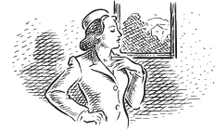
Chapter Five AUNT CLAUDIA
HARRIET’S FATHER HAD been at the same school as Uncle David. It did not take Lalla long to find this out, but it took what seemed to Lalla months and months, and was really only three weeks, before Uncle David had managed to see Harriet’s father. Although Lalla thought Uncle David was being terribly slow, he was really doing his best. First of all he went to Nana and asked what she thought of Harriet, and on learning that Nana had liked both her and Olivia, he made enquiries about the Johnsons and the shop. He tried to find some way in which he could meet George Johnson in the ordinary way, for he was certain that if he could produce Harriet’s father as an old school friend, and not as somebody who kept a peculiar sort of shop, it was much more likely that Aunt Claudia would think Harriet a good friend for Lalla. Meanwhile, whatever Aunt Claudia might think, Lalla and Harriet met every day at the rink, and every day they became greater friends.
Apart from meeting Lalla, Harriet was beginning to enjoy the rink. Every afternoon, just before the session started, she arrived, saw Sam, collected her skates and boots, put them on and was waiting, her eyes on the entrance, for Lalla and Nana several minutes before they could possibly arrive. If there had been no Lalla, Harriet would have taken twice as long learning to enjoy skating. Probably, if there had been no Lalla, she would still have been at the stage of creeping on to the rink, afraid to move far for fear of being knocked down. Because of Lalla’s lessons she had discovered quickly that moving about on ice was not really frightening, and that even cotton-woolish legs like her own could make skates move in the direction they wanted them to. Lalla was determined to make Harriet a skater. She could not spare much time from her own practice to give her a lesson, but she took her round with her to get her used to moving on skates, and she saw she only rested when there was dancing, and spent the afternoon moving round by herself.
“I know it’s dull just moving along like that, but you’ve got to do it, Harriet, or you’ll never get on to anything more interesting. Your legs look heaps better since you’ve come skating, honestly they do.”
Harriet knew that not only her legs, but all the rest of her looked better since she had come skating. Everybody at home remarked on it, and Dr Phillipson, when he came to see her, was so pleased that he said he should visit Mr Matthews an extra time as a thank offering. Harriet thought that was a very odd sort of thank offering, because she would not have wanted a visit from the doctor as a thank-you present herself; but she was glad Dr Phillipson was so pleased that he wanted to thank Mr Matthews, and if Mr Matthews liked a visit from the doctor she was glad he should have it. The person who was most proud of Harriet looking so much better was Alec. He felt as though it was he who was making her well, for after all it was his two shillings which paid for the skates, and so when it was wet and cold while he was on his paper round he did not mind as much as he might have done.
“It’d be much worse the weather being awful,” he told Toby, “If Harriet wasn’t getting any better, I should feel then it was all for nothing.”
Toby peered at Alec through his spectacles.
“Mathematically speaking, if Harriet was not getting well, that fact would be cancelled out by the two shillings weekly towards vegetables for the spring.”
Alec told Toby to shut up with his mathematical nonsense, but all the same he agreed with him about the two shillings a week. Two shillings a week adds up quickly when it is put in a money-box. Besides, to Alec it was more than two shillings a week, it was adventure, the capital that was to start him out on a magnificent career. On scraps of paper in his pockets, in his bedroom and in his desk at school were plans of how he intended his father’s shop to look. There were arrows pointing to piles of fruit and vegetables. Each plan covered a different season of the year, and each was so ambitious that had he been able to buy all the things for his plan his father’s shop would have looked like an exhibition of fruit and vegetables at a flower show. His vision of what he would buy in the spring was helped by Mr Pulton, who sometimes said to him when he paid him on Saturdays:
Конец ознакомительного фрагмента.
Текст предоставлен ООО «ЛитРес».
Прочитайте эту книгу целиком, купив полную легальную версию на ЛитРес.
Безопасно оплатить книгу можно банковской картой Visa, MasterCard, Maestro, со счета мобильного телефона, с платежного терминала, в салоне МТС или Связной, через PayPal, WebMoney, Яндекс.Деньги, QIWI Кошелек, бонусными картами или другим удобным Вам способом.


